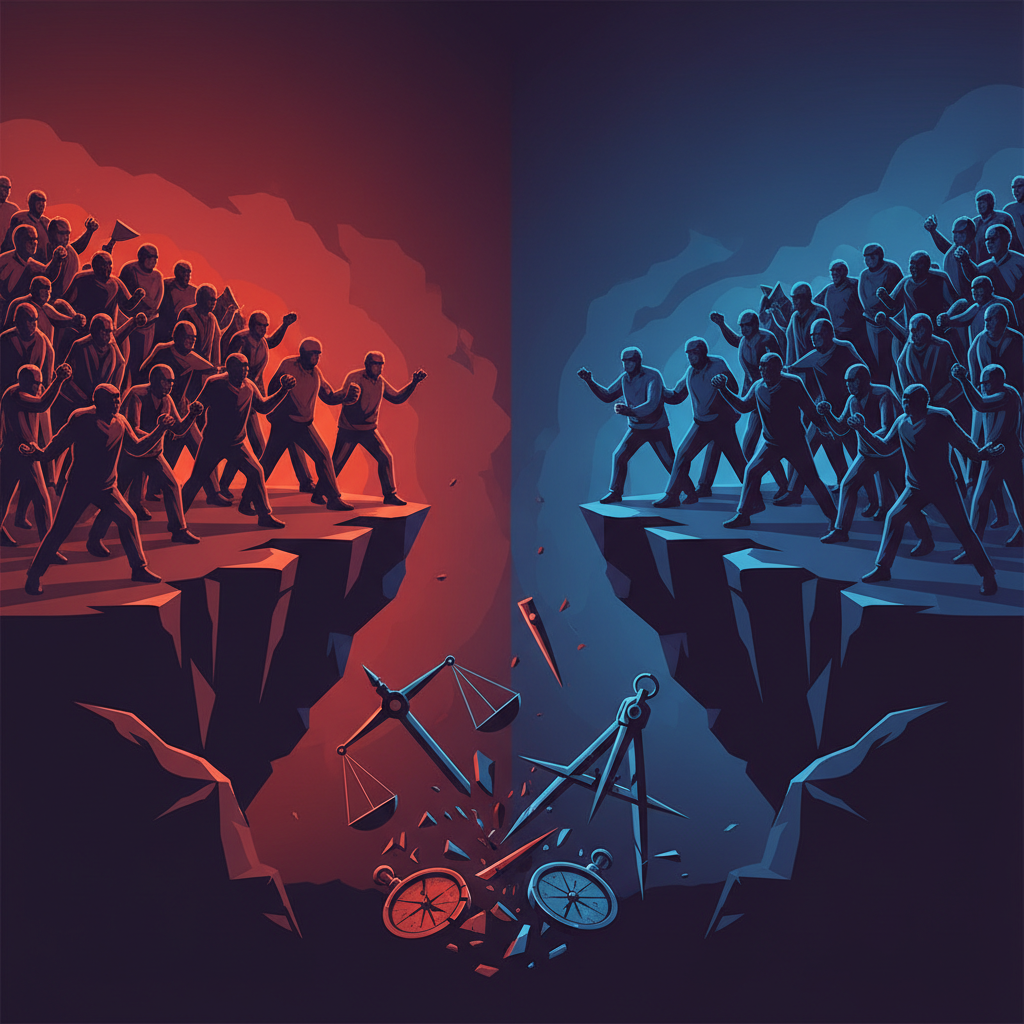America has become a post-moral society.
Not immoral - that would imply we’re violating principles we still believe in and have morality. Post-moral…we’ve abandoned moral reasoning itself.
Tribe First, Principles Never
Here’s what I mean by post-morality: Your moral position is determined by checking tribal alignment first.
Watch how this works in practice. When Elon Musk was the electric car guy fighting climate change, one tribe loved him. When he bought Twitter and started posting different opinions, that same tribe decided electric cars were actually problematic. The other tribe, which had mocked Tesla drivers as virtue-signaling liberals, suddenly discovered that EVs were pretty cool actually.
The product didn’t change. The climate impact didn’t change. Only the tribal alignment changed - and with it, everyone’s “deeply held” convictions.
The Motivated Reasoning Machine
The psychological research on this is damning. Jonathan Haidt’s work shows we don’t reason our way to moral positions - we have gut reactions and then rationalize them. But we’ve gone beyond that. We now have entire media ecosystems dedicated to providing pre-packaged rationalizations for whatever position our tribe needs us to hold this week.
The principle never mattered - only who was doing it. Remember when deficit spending was the ultimate evil? Until your party held power. Executive orders were tyrannical overreach? Until your president signed them. Tech monopolies were dangerous? Until they banned your opponents. Revealing powerful men who exploited women? Only if they voted wrong. Political violence was abhorrent? Unless it was your protesters burning the federal building. The grocery prices, the farmers, the gas prices - urgent crises that mysteriously vanished the moment the election ended.
This isn’t just hypocrisy. Hypocrisy implies you still believe in the underlying principle. This is the complete abandonment of principles in favor of pure tribal loyalty.
How We Rationalize Anything
We’ve gotten incredibly sophisticated at justifying obviously contradictory positions. We don’t just flip-flop anymore - we develop elaborate theoretical frameworks for why the thing we opposed yesterday is actually good today.
Watch how quickly “free speech is not freedom from consequences” becomes “censorship is violence” depending on who’s being censored. See how “lock them up” becomes “due process matters” depending on who’s accused. Notice how “states’ rights” becomes “federal override” depending on which policy we’re discussing.
We’ve built an entire intellectual infrastructure designed to make our tribalism look principled. Academic theories, think pieces, and lengthy Twitter threads all devoted to explaining why our side’s violence is speech but their side’s speech is violence.
The Cost: Moral Bankruptcy
When everything is justified by tribal loyalty, actual moral reasoning atrophies. We lose the ability to say “my side is wrong about this”…or even “this person who happens to also be on my side is wrong about this”…because that’s tribal betrayal. We can’t acknowledge good ideas from the other side because that’s giving aid to the enemy.
It is so disturbing is watching the emotional reactions from friends whose political views I know well. When violence occurs, when someone is wronged, their response is entirely based on who did what to whom. Silence when the perpetrator is from their tribe. Outrage and dangerous rhetoric when the victim is one of their own. The wrongdoing itself becomes secondary to the tribal affiliation of those involved. Just another chance at a “gotcha” for the other side - actual humanity and empathy be damned! Actually, let me use some of that “empathy” to make the other side hurt more…
This moral bankruptcy isn’t confined to social media or dinner table arguments - it happens at the highest levels of government. Leaders don’t even pretend to be acting morally anymore, directly doing the opposite and being praised for it. And it’s self-reinforcing: when we don’t hold our leaders to any moral standard while still claiming the moral high ground, we teach everyone that principles are just weapons to use against the other side, not standards to live by.
The Way Forward (If There Is One)
How do you restart moral reasoning in a culture that’s abandoned it? How do you get people to examine principles when tribal loyalty is the only principle left?
As Jim VandeHei wrote after the Charlie Kirk killing, we need to “break the fever. Or it might break us.” The path forward isn’t through more tribalism or better arguments for our side. It’s through individual actions that chip away at this toxic dynamic.
- Stay grounded. The most extreme voices get amplified because they’re extreme, not because they’re representative.
- Tone it down. Stop dunking on bad takes. Your outrage feeds the algorithm, destroying our ability to think.
- Turn it off. During breaking news, step away. The misinformation-to-truth ratio is staggering.
- Open up. Ask questions from curiosity, not judgment. People are more complex than their tribe.
- Practice principle. Call out your side when they’re wrong. Credit the other side when they’re right. These small tribal betrayals rebuild moral reasoning.
The question isn’t whether you engage in tribal thinking - you do. The question is whether you can occasionally step outside it and ask: would I support this if the other tribe did it? Would I oppose this if my tribe did it? Can I name a principle I’d maintain even if it cost my tribe power?
If you can’t, then you’re not engaged in moral reasoning. You’re just playing team sports with higher stakes.
The test is simple: Would you support this if the other tribe did it? If not, you’re not doing moral reasoning - you’re playing team sports with democracy as the stakes.
